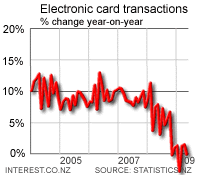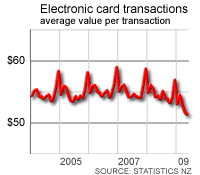 Unadjusted electronic card (EFTPOS and credit/debit) use figures released by Statistics New Zealand (Stats NZ) showed a small traditional fall in April from March, but gave no outward signs of deterioration over the month.
Seasonally adjusted, spending with electronic cards rose 0.7% in April.
"The non-retail industry was the second-largest contributor to the (0.7%) rise," Government Statistician Geoff Bascand said. "Offsetting falls came from the apparel, and automotive fuel retailing industries."
"After declines in late 2008, latest figures indicate the sales trend for total transactions has been rising in 2009," Bascand said.
The total volume of electronic card transactions was up 5.4% in April from a year ago, following 5.5% growth in March. However, the April figure is still below annual April growth of 6%-10% seen in the last 4 years. The unadjusted total volume of transactions fell from 90 million in March to 88 million in April.
Unadjusted electronic card (EFTPOS and credit/debit) use figures released by Statistics New Zealand (Stats NZ) showed a small traditional fall in April from March, but gave no outward signs of deterioration over the month.
Seasonally adjusted, spending with electronic cards rose 0.7% in April.
"The non-retail industry was the second-largest contributor to the (0.7%) rise," Government Statistician Geoff Bascand said. "Offsetting falls came from the apparel, and automotive fuel retailing industries."
"After declines in late 2008, latest figures indicate the sales trend for total transactions has been rising in 2009," Bascand said.
The total volume of electronic card transactions was up 5.4% in April from a year ago, following 5.5% growth in March. However, the April figure is still below annual April growth of 6%-10% seen in the last 4 years. The unadjusted total volume of transactions fell from 90 million in March to 88 million in April.
 The value of electronic card spending in the broader retail industries rose 0.3%, seasonally adjusted, while the core retail industries experienced a 0.5% increase from March.
"Having increased almost continuously since the series began, the sales trend for core retail flattened between November 2008 and February 2009. Latest figures suggest it has picked up again in the last two months," Bascand said.
The rise in the broader retail industries was the third consecutive monthly rise, Bascand said.
Credit card use, as a proportion of the total value transactions, saw the biggest annual drop in the year to April 2009 since the series began, Stats NZ said. This fall was accompanied by a rise in the proportion of debit card use.
The value of electronic card spending in the broader retail industries rose 0.3%, seasonally adjusted, while the core retail industries experienced a 0.5% increase from March.
"Having increased almost continuously since the series began, the sales trend for core retail flattened between November 2008 and February 2009. Latest figures suggest it has picked up again in the last two months," Bascand said.
The rise in the broader retail industries was the third consecutive monthly rise, Bascand said.
Credit card use, as a proportion of the total value transactions, saw the biggest annual drop in the year to April 2009 since the series began, Stats NZ said. This fall was accompanied by a rise in the proportion of debit card use.
Electronic card spending trend rising again, Stats NZ says
Electronic card spending trend rising again, Stats NZ says
11th May 09, 11:45am
by

We welcome your comments below. If you are not already registered, please register to comment
Remember we welcome robust, respectful and insightful debate. We don't welcome abusive or defamatory comments and will de-register those repeatedly making such comments. Our current comment policy is here.